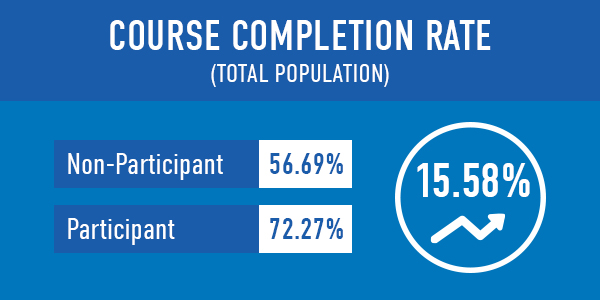Independent Study: Higher Course Completion Rates for Students Participating in Equitable Access Programs
Community college students participating in an equitable access program are much more likely to complete a course than non-participants, according to a new study from Dr. Michael Moore, a researcher out of the University of New Hampshire—Equitable Access: A Participant v. Non-Participant Course Completion Analysis from 2-Year Institutions, released recently for peer review.
The results were dramatic, showing statistical significance in increased completion rates for the total study population as well as 11 demographic categories. These findings reinforce how programs like BNC’s First Day® Complete can make a measurable impact on student outcomes.

Measuring the impact of equitable access
The report makes note of the unprecedented transformation taking place in the course materials landscape, including the rapid adoption of open educational resources (OER), inclusive access and equitable access models.
Onondaga Community College, part of The State University of New York system, and the Technical College of the Lowcountry in South Carolina participated in the study. It revealed a 72.27% completion rate for participants – or a 15.58% increase when compared against non-participants. In other words, the results suggest that participants in an equitable access course materials model are much more likely to complete a course than non-participants.
Removing structural barriers to student success
The study also showed increases in course completion rates within several demographics. These included a 21.06% increase in the course completion rate for Black students, a 17.23% increase for Pell Grant students and a 15.57% increase for Hispanic students when comparing participant and non-participant populations.
As Dr. Moore notes in the report:
“This may be an indication that one of the strongest academic interventions that can be undertaken in higher education is to provide students with their required course materials on or before the first day of class. If there are structural barriers for underrepresented student populations, these course materials models seem to be tearing them down brick by brick.”
These results complement direct student feedback about First Day Complete, showing that equitable access programs enhance the access, convenience and affordability students need to be successful.
More Insights



